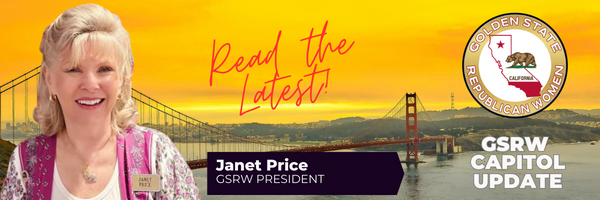October 3, 2024
Golden State Republican Women
Janet Price, President
Submitted by the GSRW Legislative Analyst Committee
Valerie Evans, Lou Ann Flaherty and Elaine Freeman,
In a very unusual situation, Governor Newsom has called a special session of the legislature in early September. The purpose of this session is to address “price gouging” by oil companies. His bill ABX 2-1 will give the California Energy Commission the ability to order refineries to keep more gasoline on hand when the refineries have to go offline for maintenance or when changing to the special fuel required by California. It is aimed at the price spikes that occur during these periods.
Both Governors from Arizona and Nevada have sent letters to the Governor asking that the State not impose new restrictions because they get over 50% of their fuel from California refineries. Interesting, since both states, particularly Arizona, fuel costs are significantly lower than California. Californians pay about $1.34 more per gallon than the national average and more than $2.61 increase since October 2022.
Unfortunately, during this special session, there may not be any action taken on California’s other regulations that affect prices at the pump. Production in California has been decreasing each year by as much as 15% just last year. There have been some Republican bills proposed including ABX2-3 which seeks to allow out of state imports, switch to cheaper winter blends; ABX2-2 that would suspend the gas tax for one year which would lower prices by more than .58 per gallon; AB X2-4 which would provide a $100 rebate to drivers and freeze proposed fuel tax increases, including those elated to the state’s low carbon fuel standard which currently add .11 cents per gallon plus another .52 in the price. The question is will Republican bills go anywhere?
There are a number of factors that have contributed to the cost of fuel including a lawsuit blocking local drilling approvals in oil-rich Kern County. The State’s landmark emissions reduction tool, the low-carbon fuel standard, has nudged two refineries to switch from gasoline to biofuels in the last five years, leaving just nine refineries producing the state’s unique blend of low polluting fuel.
Assuming this bill is signed by the Governor, which will happen since he is promoting it, the actions of the California Energy Commission will need to be watched and how these actions will change the price of fuel at the pump.
SB 1174 (Min & Newman) Elections: voter identification – Existing law permits the governing of a city or district to request that the county render specified services to the city or district regarding the conduct of an election. This bill prohibits a local government from enacting or enforcing any charter, ordinance, or regulation requiring a person to present identification for the purpose of voting or submitting a ballot at any polling place, vote center or other location where ballots are cast or submitted. SIGNED BY THE GOVERNOR
SB 227 (Durazo) Unemployment; Excluded Workers Program – Existing law authorizes the payment of unemployment compensation benefits and requires that they be made in accordance with the regulations of the Director of Employment Development.
Existing law prohibits payment of unemployment compensation benefits for services performed by a person who is not a citizen or national of the United States, unless that person is an individual who was lawfully admitted for permanent residence at the time the services were performed, was lawfully present for purposes of performing the sercies, or was permanently residing in the United States under color of law at the time the series were performed.
This bill requires on or before 3/31/25, the department to develop a detailed plan to establish a permanent Excluded Workers Program to provide cash assistance that resembles unemployment insurance benefits to unemployed workers who are ineligible for unemployment insurance due to their immigration status and submit the plan to the appropriate fiscal and policy committee of each house of the legislature, the Department of Finance and the Legislative Analyst’s Office.
The Legislative Analyst’s Office to review the plan and report any findings or recommendations to the appropriate fiscal and policy committees of each house and the Department of Finance no later than 3 months after the department submits the plan. SIGNED BY THE GOVERNOR
Legislative Portal links – Express your support or opposition to a bill or directly to the Legislative committee currently reviewing it (as an individual, not as a member of RW or GSRW) – click here, or the bill’s author – click here, enter your bill # and look for tab at top of the bill page labeled “Comments to Author”.

